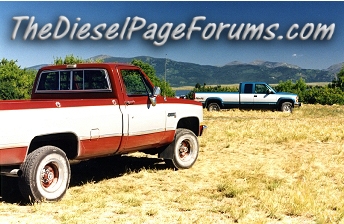'02 GMC Sierra SLT 3500 4WD D/A CC Black/Graphite (Totally Impressed with this Truck!!!) Pulls a 24' Sooner Goosneck Cattle Trailer w/a 30,000lb Draw-Tite Flush Mount Remove-a-Ball Trailer Hitch & Hayes Lemmerz Syncronizer Brake Controller
Mods So Far: Edge Juice, 4.61 HOT!!!,BD XMonitor, 4" Magnaflow Stainless Steel Exhaust w/5" S/S Tip, AFE Air Intake Snorkel, 3" Front Suspension Torsion Bar Levelling Kit, Cooper Discoverer S/T 255/85's, Bilstein Shocks F&R, Firestone Ride-Rite Air Helper Springs with in-cab Dual Air Command, Correctrack 1 3/4" Dually Spacers,F&R Centramatic Wheel Balancers, BD Exhaust Brake, Howes Fuel Additive, J&J S/S Millenium Running Boards w/lights, J&J S/S Headache Rack & Rails, J&J Lighted Grab Handles, Manik S/S Tail-Light Guards, GoRhino 7000 series S/S Brush Guard, PIAA Halogen Driving Lights, Lund Sun Visor, Cloud Rider F&R Mudflaps, S/S Door Handle and Tailgate Inserts, Style-Line S/S Wheel Inserts, Auto Ventshade Bugflector II, Auto Ventshade F&R Window Ventvisors, All Star Under Rail Box Liner, Duratrunk Tool Box, Catch-All F&R Floormats, Sportwing Chrome-Bolt Graphics across doors & dually fenders.
Just another "Farm Truck"









 ). That could be very bad if it happened in the fuel rail and consequently blew the tip off an injector.
). That could be very bad if it happened in the fuel rail and consequently blew the tip off an injector. 

 . At 50-70 ppm you might be below the threshold of where it can still separate water (particle size below micron rating of media). I never claimed these things to be 100% efficient. Yes some water will still get by as efficiency is in the low 90%. I can't recall our ppm rating after the filter as I was concerned with the % efficiency from dirty to clean side at the time, and thats all that was reported. Not to mention its been over a year since I even looked at any of this stuff.
. At 50-70 ppm you might be below the threshold of where it can still separate water (particle size below micron rating of media). I never claimed these things to be 100% efficient. Yes some water will still get by as efficiency is in the low 90%. I can't recall our ppm rating after the filter as I was concerned with the % efficiency from dirty to clean side at the time, and thats all that was reported. Not to mention its been over a year since I even looked at any of this stuff.  Tipped up an EZ-Dumper the other day and it started draining water out of a main lift support tube and it was only here a couple of months!
Tipped up an EZ-Dumper the other day and it started draining water out of a main lift support tube and it was only here a couple of months! 
